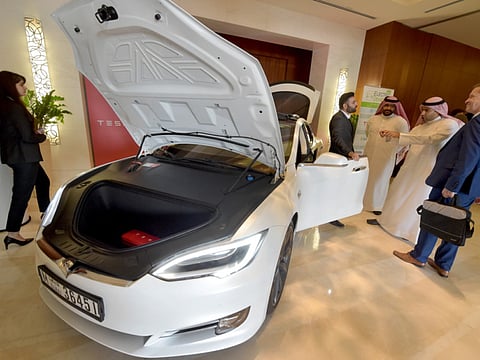Experts seek more incentives to promote electric vehicles in UAE
Federal level integration key to encouraging a shift to green mobility, they say

Dubai: Experts at the Electric Vehicles UAE conference on Tuesday called for greater incentives and better federal level integration to trigger a shift towards green mobility.
Coming close on the heels of a major announcement made by Dubai government that aimed to promote the use of zero emission vehicles, the panel of experts called for a federal level programme of subsidies and integrated platform of charging facilities.
On Sunday, the Dubai Supreme Council of Energy (DSCE) announced a series of incentives to promote the use of zero emission electric cars, including free charging until 2019, free parking in designated green parking areas, free Salik tag and free vehicle registration.
“The pack of incentives announced in Dubai recently is a great step forward but more needs to be done if we actually need to see a green mobility solution. In the West, the authorities have announced tax exemption, subsidised prices of electric cars as well as allowing the electric cars to use priority lanes,” said Samer Alawiye, CEO of Smart Parking and one of the speakers at the conference.
Martin Tillman, director of Transport Planning at Aecom, agreed.
Infrastructure
Tillman added that having the infrastructure in place is important but getting people to use the facilities is more important.
“In London, for example, the electric vehicles are exempted from the congestion tax as well as the road toll, we could have something similar here, which would be a great incentive,” he added.
Another key area highlighted by most experts at the conference is the integration of facilities.
“Having the charging stations and incentives in one emirate alone will not be enough. We will need to have the stations in all emirates and more importantly the payment system for all emirates should be the same, which means a Dubai resident should be able to conveniently charge in Abu Dhabi and vice versa, without having to access two different payment systems,” said Fatmah Al Hantoubi, lead officer, Transportation Mobility, Abu Dhabi Department of Municipal Affairs and Transport.
Integration
Suggesting a way for integration, Alawiye said that a common mobile app offering access to all stations across the country could be one of the solutions.
“What authorities can do is that they can launch a unified app and the registered users could be allowed to charge from any part of the country, the local authorities can then send the charging bill to the electricity authority where the user is based so that they can charge the user accordingly,” he said.
The federal government has mandated all its ministries and federal government entities to replace 10 per cent of its fleet with EVs while the longer term plan is to replace 20 per cent of all government vehicles with EVs.
In Dubai, the government has mandated all its departments and agencies to include 10 per cent EVs in its fleet by 2020.
According to DSCE, an estimated 2,100 EVs will be joining Dubai Government’s fleet by 2020.
The DSCE also targets a two per cent conversion to zero emission, with around 34,000 expected to enter Dubai roads by 2020.
Currently, Dubai has 274 EVs and 431 hybrid vehicles registered in the emirate.
Sign up for the Daily Briefing
Get the latest news and updates straight to your inbox



